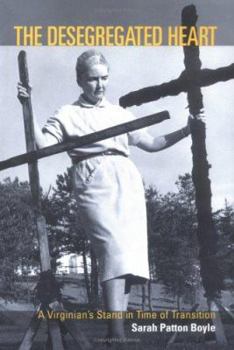The Desegregated Heart: A Virginian's Stand in Time of Transition
When first published in 1962, Sarah Patton Boyle's narrative of personal growth and change was highly praised and quickly sold more than sixty thousand copies, though few of them in the South. In it... This description may be from another edition of this product.
Format:Paperback
Language:English
ISBN:0813920299
ISBN13:9780813920290
Release Date:January 2001
Publisher:Univ of Virginia Pr
Length:388 Pages
Weight:1.20 lbs.
Dimensions:8.3" x 1.0" x 5.5"
Grade Range:Postsecondary and higher
Customer Reviews
3 ratings
Rereading Desegregated Heart after reading the Help
Published by Thriftbooks.com User , 15 years ago
After I finished reading the Help, by Kathryn Stockett, I went to my bookshelf and pulled down my 1963 edition of The Desegregated Heart. Within a few pages, Ms. Boyle corroborated what was being said in the Help. However, unlike that book, hers was a personal journey and her insights so profound. This book deserves to be read by anyone who, after reading the Help, was left feeling unsatisfied. Reading about her fighting her way through long-held prejudices was so much more enlightening than the caricatures portrayed in the Help.
A life-changing kind of book
Published by Thriftbooks.com User , 26 years ago
This book truly changed my life when I enrolled at the University of Virginia during the civil rights years of the 1960s. It was in many ways a roadmap for me during those contentious times. Nowadays whenever I see an old copy at a booksale, I buy it and pass it on. If only there had been hundreds, thousands, like it, the history of the south might have been so much better in the twentieth century. I remember hearing Sarah Patton Boyle speak on campus, and sitting next to her at a church service after President Kennedy was assassinated. I guess what I want to say is that so many books are paper and ink (and some of them tragic wastes of good trees)--and then there are the others. This is one of the others. I recommend it highly. In fact, I have recommended it to the Modern Library for their list of the hundred most important nonfiction books of the century.
Sarah Patton Boyle's experiences in Civil Rights
Published by Thriftbooks.com User , 27 years ago
Sarah Patton Boyle was a white person born into one of Virginia's "best families." During the 1950s and 60s Boyle became an activist for African American Civil Rights in Virginia. This book beautifully narrates Boyle's awakening to the plight of African Americans, and her response. An honest and forthright account, Boyle details the inner anxieties of a person moving from one world view to another. She chronicles her childhood and indoctrination with the repressive "Southern Code" that guided race relations in the South. According to Boyle, the Southern Code allowed whites to think of themselves as gracious and generous paternalists while economically exploiting African Americans. Not until the 1950s did she see how racist and dehumanizing the whole scheme was. When she did she became an activist in the Civil Rights movement. In the process she lost her belief not only in the goodness of white southerners, but in the goodness of humanity in general. She moved more towards an orthodox Christian worldview that stressed on the one hand the sinfulness of mankind and on the other the need for a strong commitment to love. This book definitely deserves to be considered a signigicant piece of Southern literature and a valuable resource for those interested in understanding the complex history of southern race relations. -Vernon Horn





